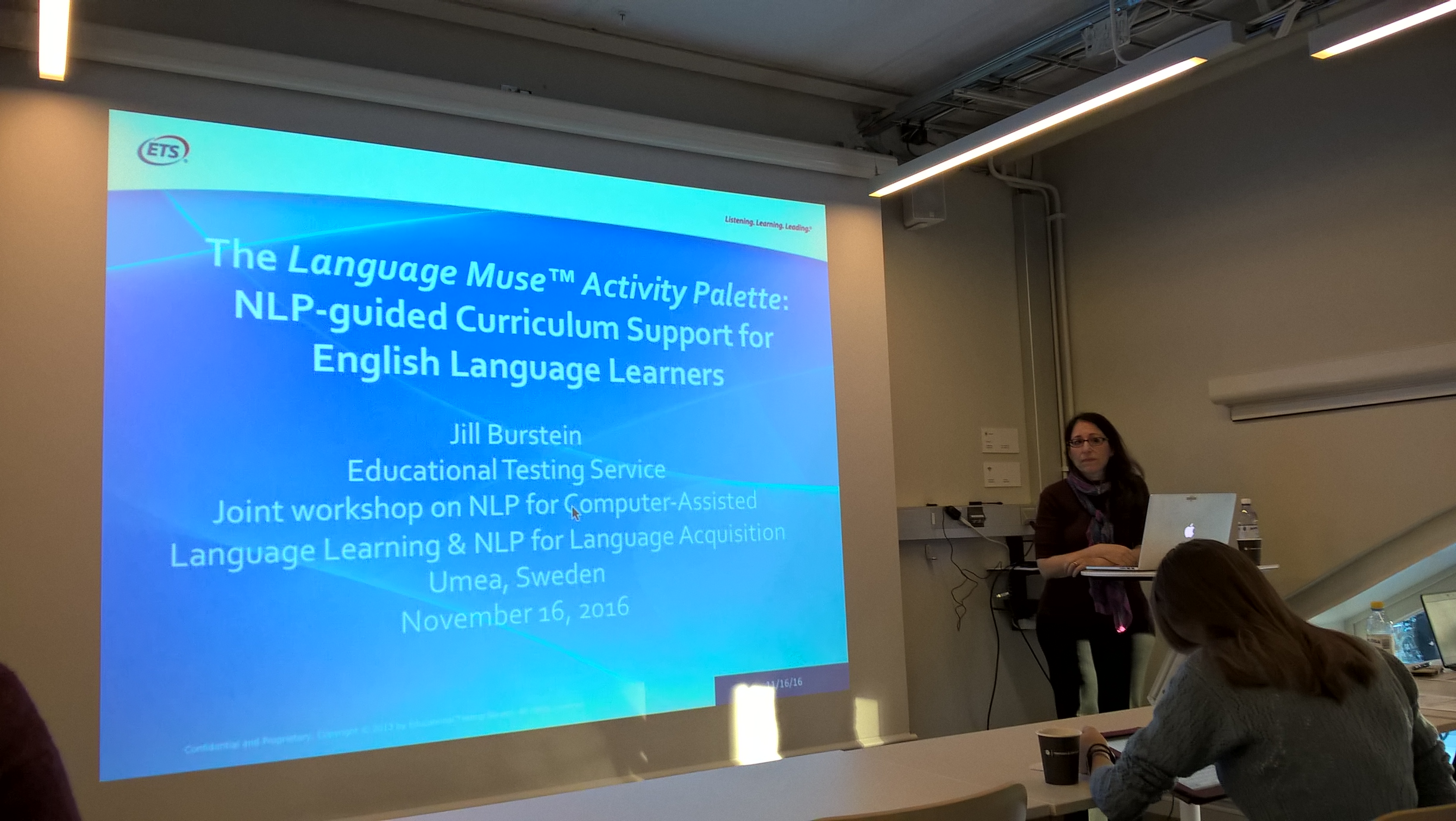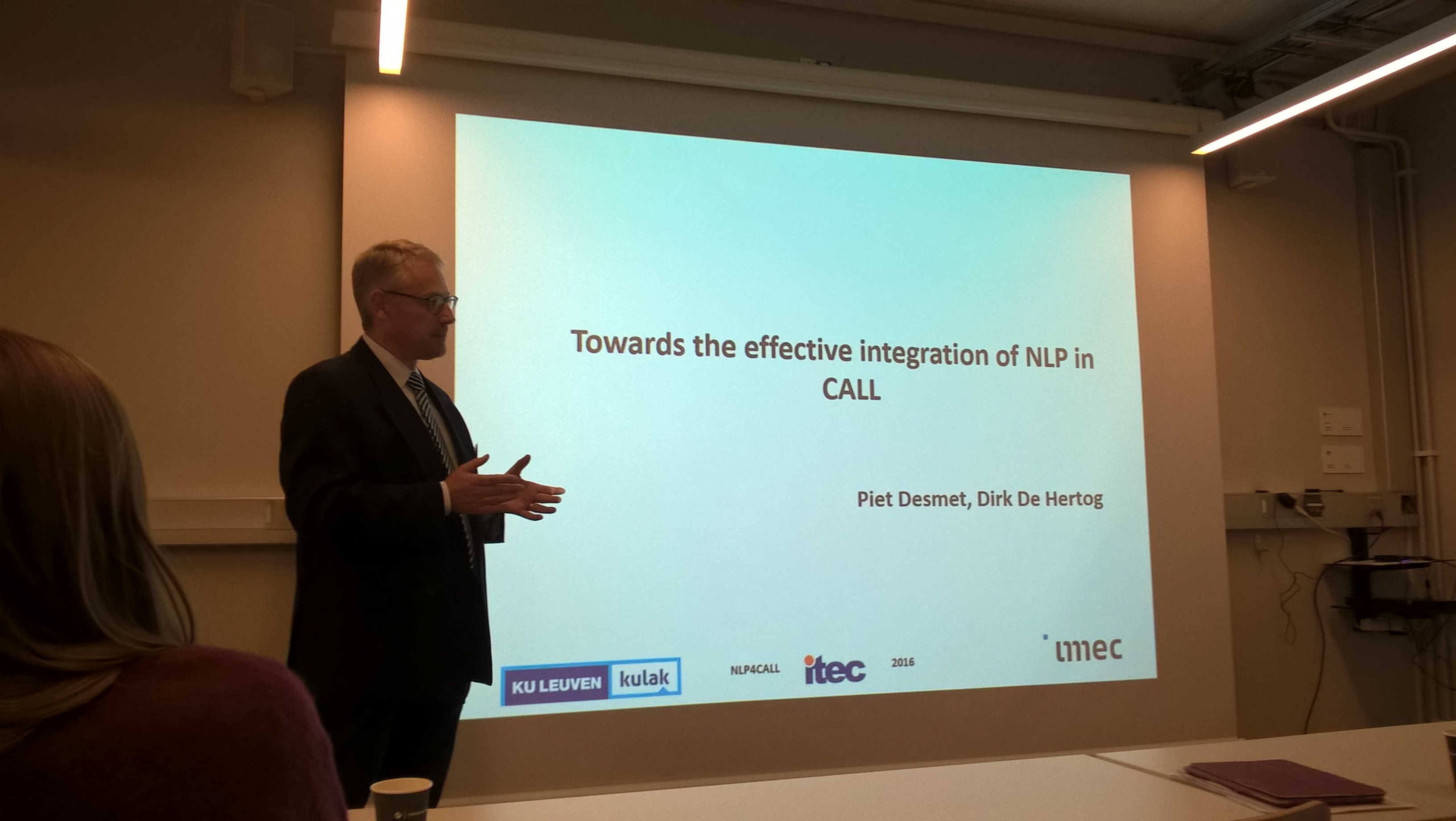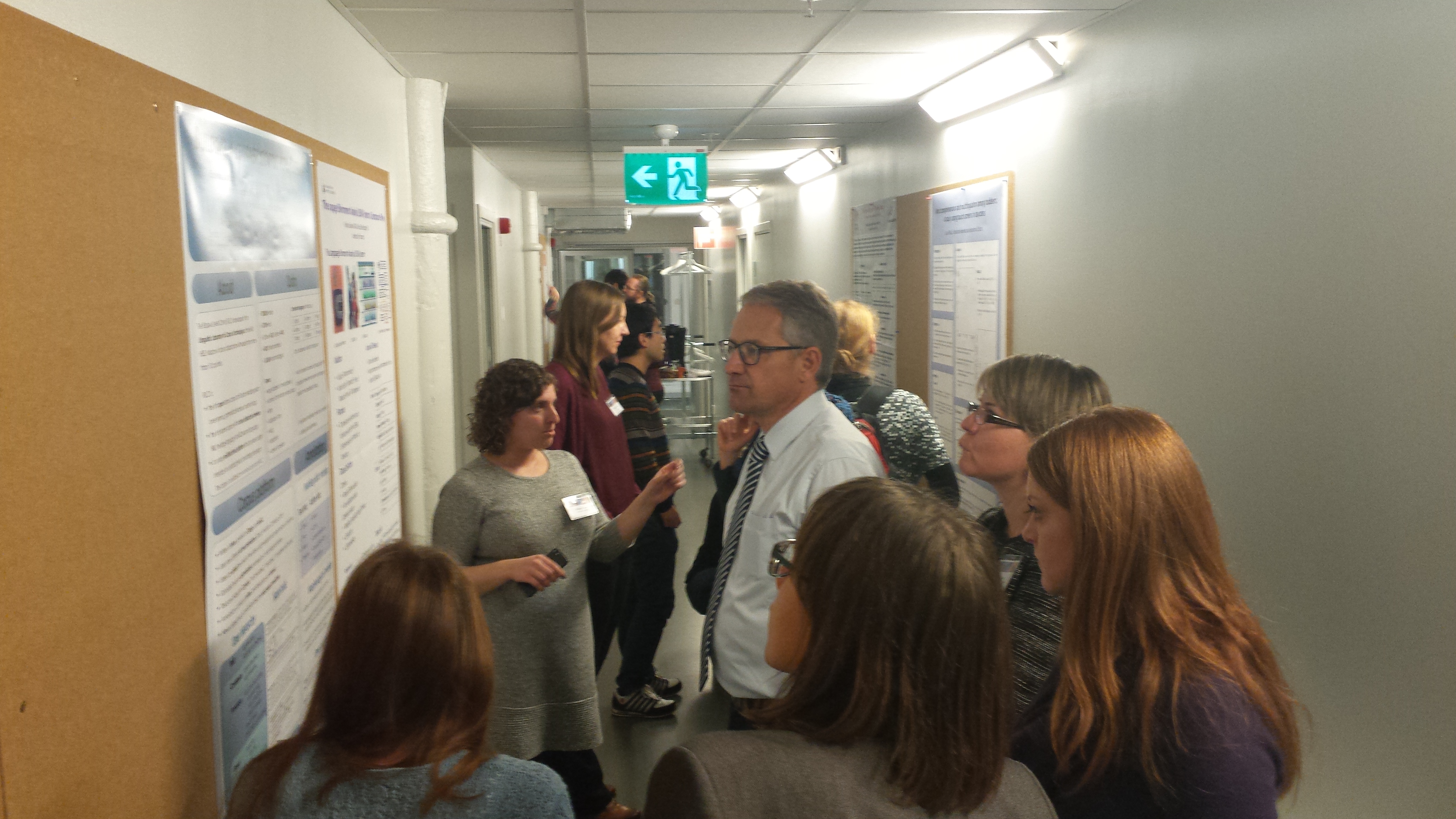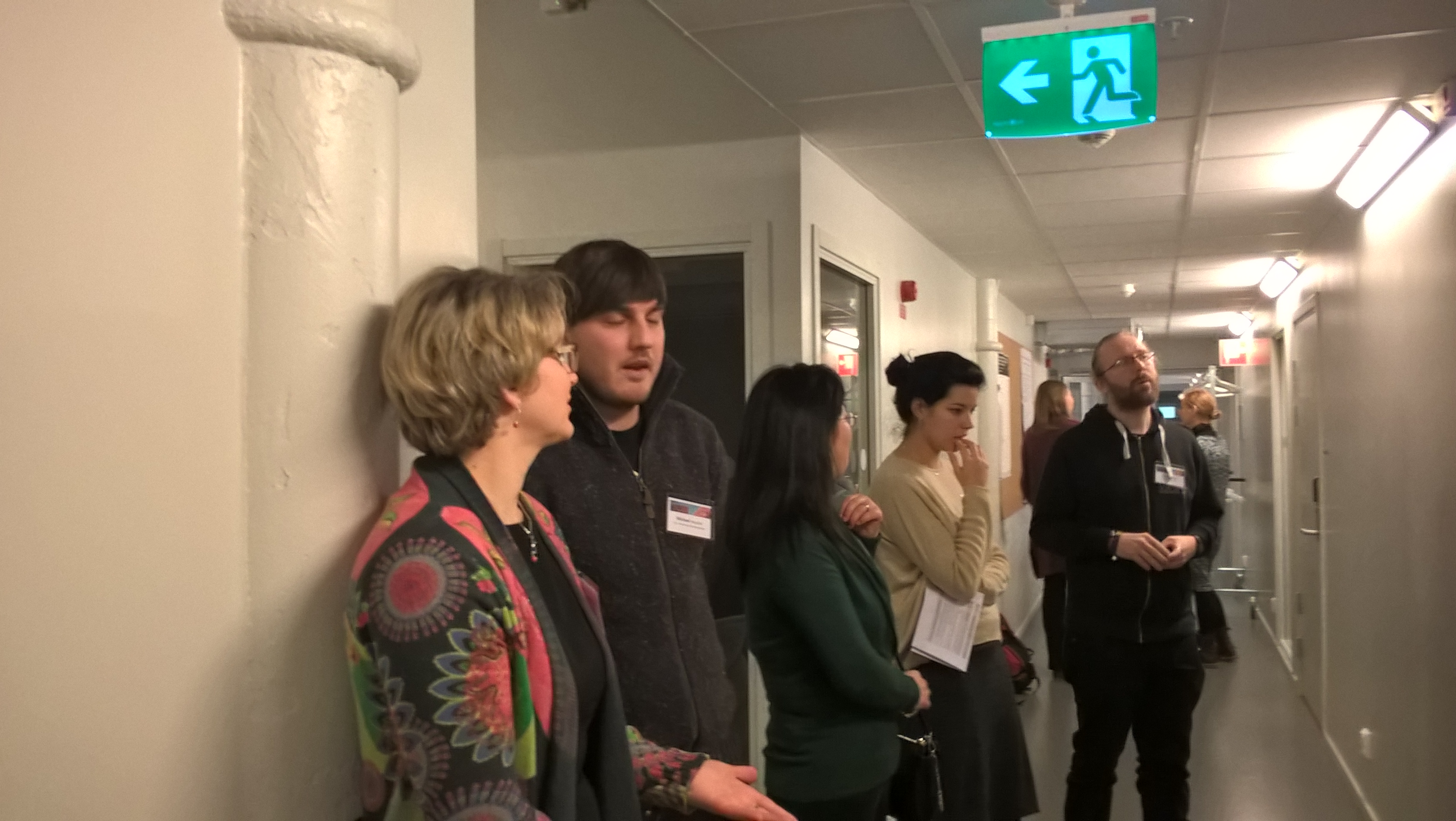SLTC workshop, Umeå, Sweden, 16 November, 2016
Proceedings from LiUPress are now available at this link
ACL-proceedings are now available at this link
Talk slides are now uploaded to the program. Enjoy!
Some workshop pictures
Workshop schedule
9.00-9.10 Introduction
9.10-9.35 Lightning talks
9.35-11.00 Poster session 1
- Neasa Ní Chiaráin and Ailbhe Ní Chasaide. Faking Intelligent CALL: the Irish context and the road ahead [pdf] [slides]
- Iria Del Río, Sandra Antunes, Amália Mendes and Maarten Janssen. Towards error annotation in a learner corpus of Portuguese [pdf] [slides]
- Man Gao. Perception of Mandarin Tones by Swedish Learners [pdf] [slides]
- Gintare Grigonyte and Kristina Nilsson Björkenstam. Language-independent exploration of repetition and variation in longitudinal child-directed speech: a tool and resources [pdf] [slides]
- Niklas Meyer, Michael Wojatzki and Torsten Zesch. Validating Bundled Gap Filling -- Empirical Evidence for Ambiguity Reduction and Language Proficiency Testing Capabilities [pdf] [slides]
10.30-11.00 Coffee break
11.00-12.00 Keynote Speaker Jill Burstein The Language Muse™ Activity Palette: NLP-guided Curriculum Support for English Learners [abstract] [slides]
12.00-13.30 Lunch
13.30-14.05 Lightning talks
14.05-15.30 Poster session 2
- David Alfter, Yuri Bizzoni, Anders Agebjörn, Elena Volodina and Ildikó Pilán. From Distributions to Labels: A Lexical Proficiency Analysis using Learner Corpora [pdf] [slides]
- Laia Fibla, Charlotte Maniel and Alejandrina Cristia. Word comprehension and multilingualism among toddlers: A study using touch screens in daycares [pdf] [slides]
- Hillary Ganek and Alice Eriks-Brophy. The Language ENvironment Analysis (LENA) System: A Literature Review [pdf] [slides]
- Elena Volodina, Ildikó Pilán, Lorena Llozhi, Baptiste Degryse and Thomas François. SweLLex: second language learners' productive vocabulary [pdf] [slides]
- Anastasia Vyrenkova, Alina Ladygina, Elmira Mustakimova, Ekaterina Rakhilina and Ivan Smirnov. Building a learner corpus for Russian [pdf] [slides]
15.00-15.30 Coffee break
15.30-16.30 Keynote Speaker Piet Desmet Towards the effective integration of NLP techniques in CALL. Why? What? How? [abstract] [slides]
16.30-16.45 Closing remarks [slides]
Invited speakers: This year we have a pleasure to invite two renowned ICALL researchers:
Jill Burstein, Educational Testing Service, USA
Jill will give a talk on The Language Muse™ Activity Palette: NLP-guided Curriculum Support for English Learners [abstract]
Piet Desmet, KU Leuven Kulak, Belgium
Piet will give a talk Towards the effective integration of NLP techniques in CALL. Why? What? How? [abstract]
Description of the workshop
We are excited to inform you that this year the 5th NLP4CALL workshop is co-organized with the 1st workshop on NLP for Research in Language Acquisition, NLP4LA. The goal of the joint workshop is to provide a meeting place for researchers working on language learning issues including both empirical and experimental studies and NLP-based applications.
This year's joint NLP4CALL & NLP4LA workshop is aimed at bringing together competences from these areas for sharing experiences and brainstorming the future of the field.
The workshop series on Natural Language Processing (NLP) for Computer-Assisted Language Learning (NLP4CALL) is a meeting place for researchers working on the integration of NLP and Speech/Dialogue Technologies in CALL systems and exploring the theoretical and methodological issues arising in this connection.
- The previous editions of this workshop series (https://spraakbanken.gu.se/eng/Research/icall/info) enjoyed wide participant geography, including researchers from Australia, Canada, Central, Southern and Northern Europe, Russia, USA. The workshops have shown the vast potential that Language Technology (LT) holds for language learning and – most importantly – the interest that LT researchers have for the domain of CALL.
- The intersection of Natural Language Processing and Speech/Dialogue Technology with Computer-Assisted Language Learning (CALL) brings “understanding” of language to CALL tools, thus making CALL intelligent. This fact has given the name for this area of research – Intelligent CALL, ICALL. As the definition suggests, apart from having excellent knowledge of Natural Language Processing and/or Speech/Dialogue Technology, ICALL researchers need good insights into the second language acquisition (SLA) theories and practices, as well as knowledge of second language pedagogy and didactics. This workshop invites therefore all ICALL-relevant research, including studies where NLP-enriched tools are used for testing SLA and pedagogical theories, and vice versa, where SLA theories/pedagogical practices are modeled in ICALL tools.
- This year we welcome papers:
- that describe research directly aimed at ICALL,
- that demonstrate actual or discuss potential use of existing Speech Technologies, NLP tools or resources for language learning,
- that describe ongoing development of resources and tools with potential usage in ICALL, either directly in interactive applications, or indirectly in materials, application or curriculum development, e.g. collecting and annotating ICALL-relevant corpora; developing tools and algorithms for readability analysis, selecting optimal corpus examples, etc.
- that discuss challenges and/or research agenda for ICALL
- we are also interested in software demonstrations
The workshop on NLP for Language Processing for Research in Language Acquisition (NLP4LA) broadens the scope of this year’s joint workshop to also include theoretical, empirical, and experimental investigation of first, second and bilingual language acquisition.
- We believe that this field will benefit from collaboration between the NLP, linguistics, psychology and cognitive science communities. The workshop is targeted at anyone interested in the relevance of computational techniques for first, second and bilingual language acquisition. Therefore, our aim is to bring together researchers from different fields with a shared interest in language acquisition.
- For the track of NLP for Language Acquisition we welcome papers on, but not limited to, the following topics:
- Empirical studies on language learner data,
- Computational models of first, second and bilingual language acquisition,
- Empirical or experimental studies, or computational models of various aspects of language and their effect in language comprehension and acquisition,
- Data resources and tools for investigating language acquisition,
- Psycholinguistic and socio-linguistic investigations on first, second and bilingual language acquisition.
We especially invite submissions describing the above-mentioned themes for the Nordic languages; and papers that focus on different age groups, cultures, and language variation.
Submission information
We will be using NAACL 2016 template for the workshop this year. Authors are invited to submit long papers (8-12 pages) alternatively short papers (4-7 pages), page count not including references. Only pdf files will be accepted. Submissions will be managed through the electronic conference management system EasyChair. Final camera-ready versions of accepted papers will be given an additional page to address reviewer comments.
Papers should describe original unpublished work or work-in-progress. Every paper will be reviewed by at least 2 members of the program committee. As reviewing will be blind, please ensure that papers are anonymous. Self-references that reveal the author's identity, e.g., "We previously showed (Smith, 1991) ...", should be avoided. Instead, use citations such as "Smith previously showed (Smith, 1991) ...". Submissions will be judged on appropriateness, clarity, originality/innovativeness, correctness/soundness, meaningful comparison, significance and impact of ideas or results.
All accepted papers will be collected into a proceedings volume to be submitted for publication in the NEALT Proceeding Series (Linköping Electronic Conference Proceedings) and, additionally, double-published through ACL anthology, following experiences from previous workshops, e.g. the 3rd NLP4CALL.
Important dates:
- 2 June, Thursday: first call for papers
- 22 August, Monday: second call for papers
- 16 September, Friday: final call for papers
- 27 September, Tuesday: paper submission deadline (short and long)
- 3 October, Monday: extended paper deadline
- 18 October, Tuesday: notification of acceptance
- 1 November, Tuesday: camera-ready papers for publication
- 16 November, Wednesday: workshop date
Invited speakers
This year we have a pleasure to invite two renowned ICALL researchers:
Jill Burstein, Educational Testing Service, USA
- Jill Burstein is a Research Director of the Natural Language Processing Group in Research & Development at Educational Testing Service in Princeton, New Jersey. Her research interests span Natural Language Processing for educational technology, automated essay scoring and evaluation, discourse and sentiment analysis, argumentation mining, education policy, English language learning, and writing research. The intersection of her interests has led to two extensively used commercial applications for English L2 learners: E-rater®, ETS' automated essay evaluation application, and the Language Muse Activity PaletteTM -- a new classroom tool under development targeting English learners that automatically generates language activities for classroom texts to support content comprehension. Jill Burstein is one of the most successful researchers within ICALL that together with a group of bright researchers made ICALL tools a reality for many teachers of L2 English.
- The Language Muse™ Activity Palette: NLP-guided Curriculum Support for English Learners
- Abstract: The English Language Arts Common Core State Standards in the U.S. emphasizes that all learners need to read progressively more complex texts in the content areas, preparing learners for college and careers. English learners (ELs) must master many linguistic features required to understand texts. Linguistic features include, but are not limited to, vocabulary, figurative language, complex phrases and sentence structures, and connections between discourse elements. All U.S. Kindergarten – grade 12 (K-12) teachers must effectively support ELs’ linguistic needs. This talk will discuss the motivation behind, and the development of a web-based application to improve teachers' ability to support ELs understanding of classroom texts. The application, the Language Muse™ Activity Palette (the “Palette”) system uses natural language processing (NLP) to automatically generate language-based activities for classroom texts. Activities are designed to support students’ content comprehension and language skills development in their content-area classes. Using the Palette, teachers can create and assign activity sets – or, “palettes” to students as paper-and-pencil or online activities, supporting ELs facility with vocabulary, complex phrases and sentences, and discourse relations. The talk will also discuss findings from a Spring 2016 classroom pilot with 3 U.S. middle schools with high EL populations, including a presentation of findings from usage logs and teachers’ perceptions of tool effectiveness from teacher survey responses.
Piet Desmet, KU Leuven Kulak, Belgium
- Piet Desmet is Full Professor of French and Applied linguistics and Computer-Assisted Language Learning at KU Leuven and KU Leuven KULAK. He coordinates the imec-research team ITEC (Interactive Technologies), focusing on domain-specific educational technology with a main interest in language learning & technology. He leads a range of research projects in this field focusing on such topics as adaptive and personalized learning, input enhancement, intelligent feedback or automated analysis and annotation of text corpora using natural language processing. He also coordinates the large-scale research project TECOL focusing on technology-enhanced collaborative learning. He is director of more than 15 PhDs (finished and ongoing) and author of publications in journals such as Language Learning & Technology, System, ReCALL or CALL Journal). He has been presenter at many international conferences (CALICO, WORLDCALL, EUROCALL, UNTELE, EDMEDIA, etc.) and organizer of different international symposia. He was involved in the creation of two spin-offs in the field. All this makes him a renowned scholar in our field with theoretical as well as practical contributions to the integration of NLP into CALL.
- "Towards the effective integration of NLP techniques in CALL. Why? What? How?” (Based on joint work with Dirk De Hertog (ITEC-iMinds-KU Leuven)
- Abstract: Our aim is to offer a tentative typology of the possible roles NLP may play in CALL, focusing hereby exclusively on written language input and output. We see at least 3 fields in which NLP is implied, involving first the exploitation of native language, second the use of learner output and third, intelligent tutoring. These three fields each brings to the table challenges, but likewise opportunities. We will offer a conceptual outline and map these three fields to a total of 7 functionalities: (1) providing access to resources, (2) Accompanying and supporting the reading process, (3) generating exercises and tests, (4) detecting errors and providing feedback in semi-open practice tasks, (5) supporting the writing process, (6) providing target language input and (7) adaptive item sequencing. This will allow us to give a balanced picture of the challenges and opportunities of ICALL.
Program committee:
- Lars Ahrenberg, Linköping University, Sweden
- Eckhard Bick, University of Southern Denmark, Denmark
- Lars Borin, University of Gothenburg, Sweden
- Antonio Branco, University of Lisboa, Portugal
- Jill Burstein, Educational Testing Service, USA
- Piet Desmet, KU Leuven Kulak, Belgium
- Simon Dobnik, University of Gothenburg, Sweden
- Thomas Francois, UCLouvain, Belgium
- Katarina Heimann Mühlenbock, DART, Sahlgrenska Universitetssjukhuset, Sweden
- Sofie Johansson, University of Gothenburg, Sweden
- Peter Ljunglöf, Chalmers Tekniska Högskolan, Sweden
- Staffan Larsson, University of Gothenburg, Sweden
- Montse Maritxalar, University of the Basque country, Spain
- Detmar Meurers, University of Tübingen, Germany
- Martí Quixal, University of Tübingen, Germany
- Mathias Schulze, University of Waterloo, Canada
- Joel Tetreault, Yahoo! Labs, USA
- Trond Trosterud, Universitetet i Tromsø, Norway
- Cornelia Tschichold, Swansea University, UK
- Francis Tyers, The Arctic University of Norway, Norway
- Sowmya Vajjala, Iowa State University, US
- Elena Volodina, University of Gothenburg, Sweden
- Torsten Zesch, University of Duisburg-Essen, Germany
- Robert Östling, Stockholm University, Sweden
- Florencia Alam, CONICET, Argentina
- Christina Bergmann, Centre National de la Recherche Scientifique, France
- Alex Cristia, Centre National de la Recherche Scientifique, ENS-DEC, EHESS, France
- Gintare Grigonyte, Stockholm University, Sweden
- Anna Gudmundsson, Stockholm University, Sweden
- Jana Götze, KTH, Sweden
- Björn Hammarberg, Stockholm University, Sweden
- Chigusa Kurumada, University of Rochester, USA
- Ellen Marklund, Stockholm University, Sweden
- Kristina Nilsson Björkenstam, Stockholm University, Sweden
- John K. Pate, The University at Buffalo, USA
- Lena Renner, Stockholm University, Sweden
- Gerold Schneider, University of Konstanz, Germany
- Iris-Corinna Schwarz , Stockholm University
- Philip Shaw, Stockholm University, Sweden
- Jennifer Spenader, University of Groningen, Netherlands
- Sofia Strömbergsson, Karolinska Institutet, Sweden
- Paul Vogt, Tilburg University, Netherlands
Workshop organizers
- Elena Volodina, Språkbanken, Department of Swedish, University of Gothenburg; elena dot volodina at svenska dot gu dot se (Organizing chair)
- Lars Borin, Språkbanken, Department of Swedish, University of Gothenburg; lars dot borin at svenska dot gu dot se
- Ildikó Pilán, Språkbanken, Department of Swedish, University of Gothenburg; ildiko dot pilan at svenska dot gu dot se
- Gintare Grigonyte, Department of Linguistics, Stockholm Univeristy
- Kristina Nilsson Björkenstam, Department of Linguistics, Stockholm Univeristy
This workshop follows a series of workshops on NLP for CALL organized by a Special Interest Group in Intelligent Computer-Assisted Language Learning (SIG-ICALL of NEALT). The workshop series has previously been financed by the Center for Language Technology at the University of Gothenburg.
We intend to continue this workshop series, which up to date has been the only ICALL-relevant recurring event based in the Nordic countries. Our intention is to co-locate the workshop series with the two major LT events in Scandinavia, SLTC and Nodalida, thus making this workshop an annual event. Through this workshop, we intend to profile ICALL research in Nordic countries and to provide a dissemination venue for researchers active in this area.
Related links
- 4th workshop on NLP for CALL
- 3rd workshop on NLP for CALL
- 2nd workshop on NLP for CALL
- 1st workshop on NLP for CALL
- SIG-ICALL, NEALT
For NLP4CALL inquiries, please email Elena Volodina (elena dot volodina at svenska dot gu dot se)
For NLP4LA inquiries, please email Gintare Grigonyte (gintare at ling dot su dot se)






